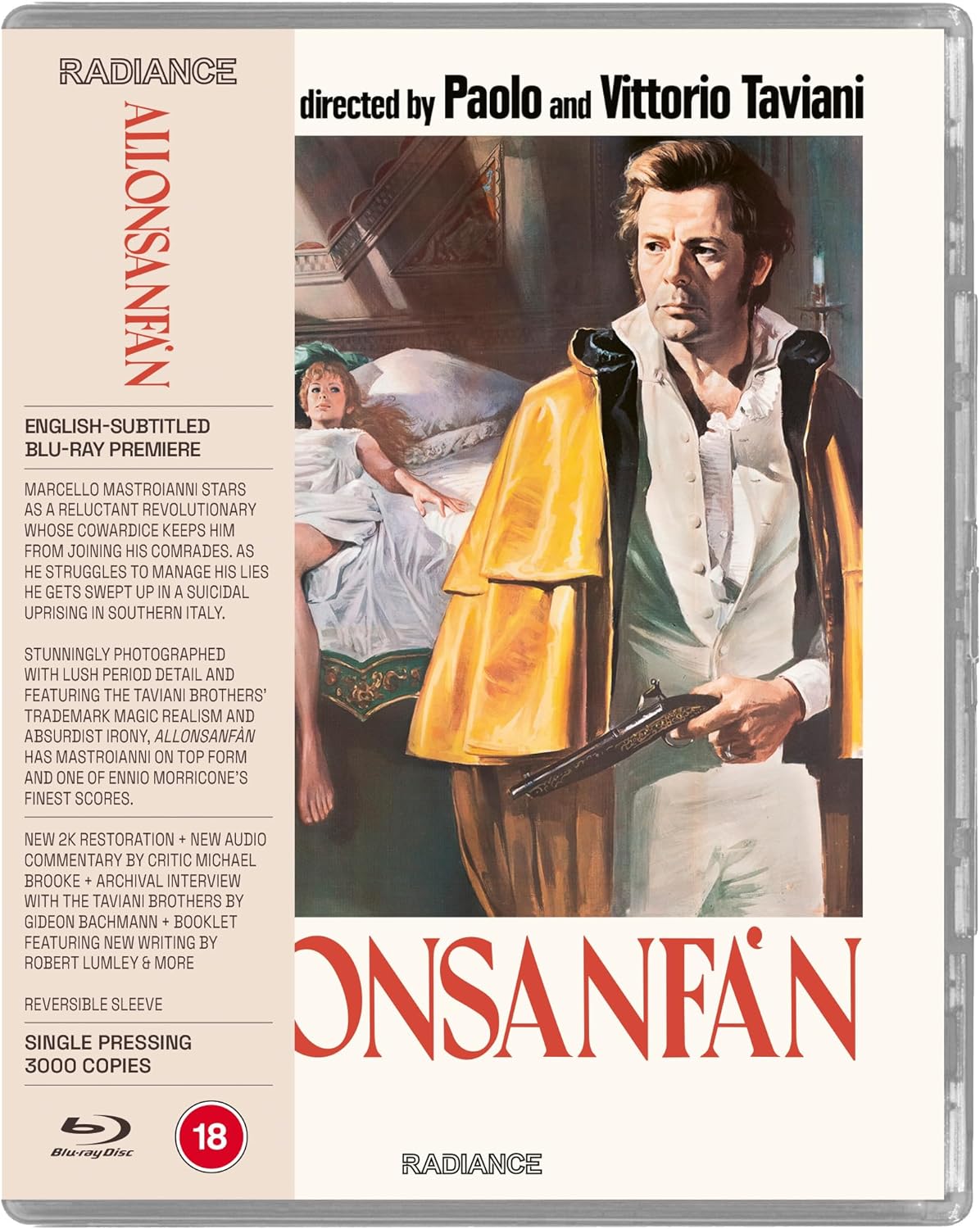The setting is France in the wake of the Napoleonic Wars in the mid 1800s. Marcello Mastrioanni is Fulvio Imbriani, a man of noble birth who refuses to give up the location of a secret revolutionary group called the Sublime Brothers. The Grand Duke decides to free Fulvio at the advice of his consigliere. At the same time, they spread rumor that Fulvio has betrayed his brothers, essentially using Fulvio as bait to locate the revolutionary group in the hopes they will reveal themselves by capturing Fulvio to deal justice upon him as a traitor. Fulvio becomes disillusioned with his political beliefs and his supposed compatriots, ultimately leading to a real betrayal and pitting Fulvio against his former brothers-in-arms.
To be honest, I am not what one would call the biggest fan of historical dramas, usually finding them dry, stuffy and lacking in forward momentum. So when I saw that Radiance was putting out a film I was unfamiliar with about French revolutionaries in the 19th century, I thought to myself, could this be the first Radiance release that fails to interest me? Fortunately Radiance has come through and surprised the pants off me. To call this film a historical drama is akin to referring to Kubrick’s The Shining as a travelogue of a hotel or to Citizen Kane as a newspaperman biopic. The backdrop of the French Restoration is merely window dressing for what is equal parts political allegory and bitterly ironic moral tale with splashes of Brechtian artifice and subtly wry, dark humor bordering on absurdism at times. Mastrioanni is excellent in what I think might be one of his best roles as a pretender to ideals loftier than what he is truly capable of. His haggard expression is a mirror of his worn-down internal allegiances to something he slowly awakens to antipathy over. He is cowardly and self-serving, willing to cast aside friend and family alike to save his own skin. I said earlier than the film is a political allegory but perhaps it is more accurate to call it an apolitical allegory. Every political ideal spoken feels hollow and meaningless. Sincerity is a foreign concept to everyone in this film. The Taviani brothers aren’t interested in the politics of the time. They seem to want to put on a show. The whole film has a theatricality to it that belies the more grounded neo-realist influences that the Tavianis obviously drew from at times. At times the tone could even be called playful. The Tavianis show a strong visual sense alternating between a pastoral softness and rich colors and textures, luxuriant costuming and a keen eye for framing. Even before the essay by Robert Lumley included in the physical booklet referenced Kubrick’s Barry Lyndon, I was reminded of that film many times while watching Allonsanfàn. Like Kubrick, the Tavianis aren’t interested in telling a factual story of an event that happened but playing off archetypes to find a more robust and fertile core idea. Supplementing the visuals and acting is Ennio Morricone’s excellent score, playing up the grandiose, hyper-real and expressionistic tone to near musical proportions almost reminiscent of Kurt Weill in places. While this score is certainly not as well known as many of Morricone’s others, it is deserving of more attention. In fact, I would love to track down the out of print soundtrack for this (Radiance! Where was my CD extra here!?).
Radiance provides us with a nice 2K restoration from the original negative that showcases the rich color palette of the film quite well. While it does have a healthy amount of grain, it never feels excessive and looks organic to the transfer. On the audio front, we have an uncompressed mono track in the original French and while it comes across nice and clear, I selfishly would’ve loved a 5.1 isolated score track as well. The extras for once actually feel a bit light for Radiance. The main extra here is the audio commentary by critic Michael Brooke, and it is actually very informative. Brooke is very knowledgable about the film’s themes and ideas and is able to put more context into specific scenes that might not always be obvious. This is exactly the kind of commentary this film needs. Also included is an audio-only discussion between Paolo Traviani, Florestano Viccini, Nelo Risi and Anna Gobi. There are some interesting conversations peppered throughout here but the audio-only nature of it, played over a black screen makes it a bit hard to concentrate on for its nearly hour-long runtime. It would’ve helped if it had taken a more visual essay approach and used still photographs of the filmmakers as well as clips from movies referenced and other context specific imagery. Despite the drawbacks, it’s still a nice inclusion. Finally, as already mentioned, we have another excellent physical booklet from Radiance containing an essay on the film by Robert Lumley and an article written by Belgian film critic Andrée Tournès originally printed in the film magazine Jeune Cinema in 1975 that includes a very illuminating interview with the Tavianis on the themes of the film.
Radiance has done it again. They have unearthed an fairly obscure Italian film that uses the historical drama as a means of delving into the dark heart of the human soul and have delivered it in a package that showcases the visual and metaphorical richness of the film appropriately. While the extras feel a little light this time, overall this is another film well worth checking out.

